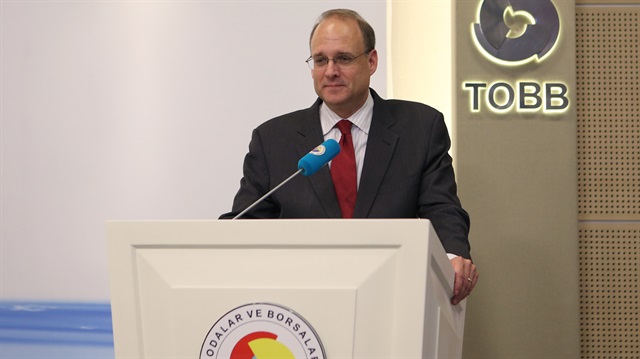
Washington is sensitive to the consequences of the U.S. withdrawal from the Iran nuclear deal on the Turkish economy, a senior U.S. Treasury official said on Friday.
Marshall Billingslea briefed reporters in Ankara on discussions between his delegation and officials in Turkey.
Billingslea, the U.S. assistant treasury secretary for terrorist financing, said the major reason for his visit is to discuss "the world’s worst sponsor of terrorism, which is Iran."
"And to discuss the assessment that the U.S. has made regarding the various activities that the Iranian regime is engaged in which are a direct threat to the U.S., Turkey, and other NATO allies," he said.
Billingslea said he visited Turkey "because of the close relationship we have as a NATO ally and as a partner on so many of the important strategic issues we face in the world."
He said a major topic of the discussions between U.S. and Turkish officials was joint operations against terrorist financing.
"In fact we covered a lot of issues today. We also have very good and close cooperation between the Treasury Department and the parts of the Turkish government that deal with terrorist financing," he said.
Billingslea said the talks were very positive. "There was no hostility on either side."
On the U.S. pulling out of the Iran nuclear deal, Billingslea said: "We are very sensitive to the effects that could be had on the Turkish economy. That’s what we’re discussing, the very specific matters of concern for both countries."
In July 2015, the U.S., U.K., France, China, Russia and Germany signed the nuclear deal with Iran.
Under the deal, world powers agreed to lift some economic sanctions on Iran in return for Tehran agreeing to limit its nuclear activity to peaceful civilian purposes. But this May, U.S. President Donald Trump announced that his country was unilaterally withdrawing.
With the other countries staying in the deal, questions have been raised on how the U.S. re-imposing sanctions will affect countries still doing business with Iran.
- Concerns over Iran
Billingslea said in the wake of the U.S. withdrawal, the first sanctions would be re-imposed at the beginning of August, followed by sanctions on the oil trade and Iran’s central bank in November.
"The Treasury sanctions will be enforced very, very aggressively and very comprehensively because Iran's behavior has become so concerning that they risk triggering a crisis in the Middle East," he argued.
Billingslea said Iran’s actions are making the world a very dangerous place.
"What happens if one of their missiles lands in Riyadh [Saudi Arabia]? What happens if the Iranian-backed militias make a miscalculation in Syria with Israel?” he asked.
"So we feel that economic pressure is the appropriate way to tackle this problem to avoid any kind of miscalculation. So you should expect that we will be much more active than in the past."
He said that the Turkish government understands the U.S. position on that, arguing: "Iran may be a neighbor of Turkey but they are not a friend or ally."
Billingslea said they are also tracking the gold trade with Iran. "It would certainly be a very bad idea to think that when somebody is going to trade with Iran in gold and [thereby] avoid the U.S. sanctions if that occurs."
"We’re not in a position to signal flexibility on oil trade at this stage but we need a lot more information and a lot more details before we could make such a signal," Billingslea added.
He also advised Turkish companies to make an informed business decision if they want to continue to do business with Iran in the areas prohibited under U.S. sanctions.
"They have to understand that they will not do business in the U.S. market if they do that," Billingslea said.
- Terrorist PKK
Billingslea said he is also in Ankara to provide additional information to Turkey's government on operatives of the terrorist PKK, their locations, and what they are doing.
"We are committed to that," he said.
He said the U.S. intensified its cooperation with Turkey on that issue in recent months.
"A series of requests was made to me on matters that we have investigated and I shared [information] on this investigation.
"We have a new government in the U.S., President Trump and his perspective and his desire to work very closely with the Turkish government on these topics," he added.
Listed as a terrorist organization by Turkey, the U.S. and the EU, the PKK resumed its armed campaign against Turkey in July 2015.
Since then, it has been responsible for the deaths of more than 1,200 Turkish security personnel and civilians.














